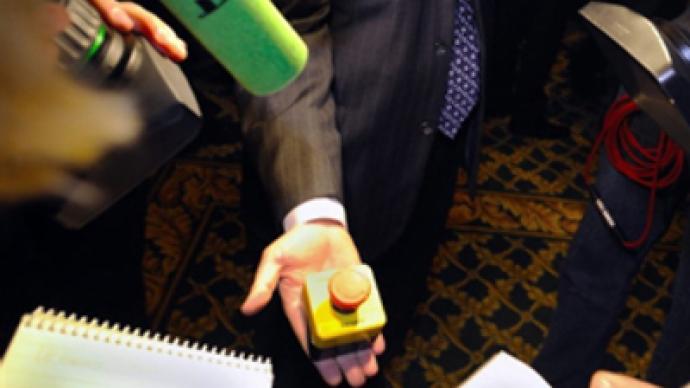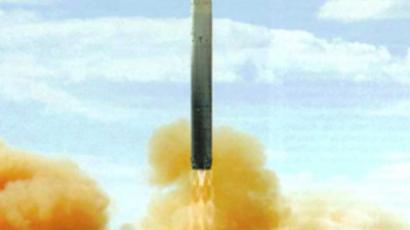Clinton and Lavrov hit the “peregruzka” button

Despite US Secretary of State Hillary Clinton stumbling over the Russian language, she and Russian Foreign Minister Sergey Lavrov found common ground in Geneva.
Before their two-hour meeting on Friday, things got off to a rather comical start as Clinton handed her Russian counterpart a small gift box that was wrapped up in green paper and a green ribbon. With the reporters looking on in suspense, Lavrov unwrapped the gift and produced a red reset button fixed to a bright yellow box, symbolic of Vice President Joe Biden’s memorable pledge to “hit the reset button” on US relations with Russia. But there was one small glitch.
Unfortunately, the American side had attached the word “peregruzka” on the makeshift device as the Russian translation for the word reset. Lavrov could not resist a lighthearted remark on the oversight.
“You’ve got it wrong,” Lavrov commented with a smile. He then explained that the words the Americans chose – “peregruzka” meant “overload” as opposed to “reset” (The correct choice of word should have been ‘perezagruzka’). But the Russian minister nevertheless thanked Clinton for the warm intentions.
What followed was a perfect photo opportunity as Clinton and Lavrov pushed down on the reset plunger together, symbolically activating a brand new day in US-Russian relations.
Regardless of the dodgy translation, the reset button gimmick went down well since it allows for a ceremonial, albeit virtual, rebooting of relations.
“We are receiving very positive signals and we welcome them,” Dmitry Peskov, Prime Minister Vladimir Putin’s spokesman told Voice of Russia radio on Friday.
Lights, cameras, reset
In hindsight, it seems that America’s use of the Russian word peregruzka, “overloaded,” was somehow appropriate.
Clinton acknowledged as much later to reporters when they asked her about the mistake.
“The minister corrected our word choice,” Clinton rationalized. “But in a way, the word that was on the button turns out to be also true. We are resetting; and because we are resetting, the minister and I have an ‘overload’ of word.”
Indeed they do. Although the meeting between Clinton and Lavrov produced no treaties or major breakthroughs, it did signal the start of restored relations, which took a severe beating during the Bush-Putin years when geopolitical muscling was the main theme.
The real success of the Clinton-Lavrov meeting in Geneva was that it lays the groundwork for an anticipated meeting between US President Barack Obama and President Dmitry Medvedev at the G20 economic summit in England in early April. The highpoint of that meeting, diplomats say, will be discussions on the initial details for a new arms reduction treaty.
The timing is crucial since the Strategic Arms Reduction Treaty (START-1), signed between the Soviet Union and the US in 1991, will expire on December 5, 2009. Moscow is adamant that the signing of a new nuclear disarmament treaty will only be possible if Washington abandons its plans to build a missile defense system in Poland and the Czech Republic.
“On December 5th of this year the Treaty on the Reduction and Limitation of strategic offensive weapons START I expires,” Lavrov told the Conference on Disarmament. “The importance of this instrument for ensuring international peace can hardly be overestimated… and its implementation has made the world safer.”
Lavrov made it clear in his speech that the initiatives Russia has in mind are not just for the United States and Russia.
Speaking about the prospects of banning intermediate-range and shorter-range missiles, Lavrov told the delegates, “We are once again calling for substantively discussing this initiative, which has quite a few supporters… French President Nicolas Sarkozy’s proposals on starting negotiations on banning surface-to-surface intermediate range and shorter-range missiles, which have been supported by the European Union, are consonant with our ideas.”
Concerning the issue of Russia’s cooperation with Iran, which some countries, including the United States and Israel, suspect of secretly developing a nuclear weapons program, Lavrov said that Russia is only supplying Iran with defense weapons.
“We are not violating anything in our military-technological cooperation with Iran,” Lavrov said at a press conference summing up his talks with Clinton.
Speaking on the prospects of an arms race in outer space, Lavrov said “The prevention of an arms race in space will help make the strategic situation more predictable… it is easier to prevent the deployment of weapons in space than to deal with new weapons stockpiles in the future.”
Both Hillary Clinton and Lavrov had positive things to say about their first meeting.
“I have been encouraged by the results of yesterday’s negotiations,” Lavrov told reporters in Geneva on Saturday, a day after his talks with Hillary Clinton. “I expect that the first contacts between the presidents to take place in London in April will be productive.”
Hillary Clinton promised not to “overload” US-Russian relations any more than was necessary.














